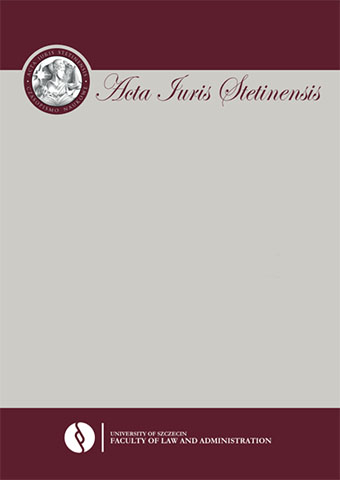







| Authors: |
Dominika
Mróz-Krysta

Chair of Civil Law, Faculty of Law and Administration, Jagiellonian University |
| Keywords: | retention right analogy expenditures personal property joint property |
| Data publikacji całości: | 2019 |
| Page range: | 16 (135-150) |
| Downloads ?: | 445 |
| 1. | Bieranowski, A., Prawa małżonków do mieszkania, in: Małżeńskie prawo majątkowe. Warszawa 2014. |
| 2. | Czachórski, W., et al., Zobowiązania. Zarys wykładu. Warszawa 2009. |
| 3. | Doliwa, A., in Załucki, M. (ed.), Kodeks cywilny. Komentarz. Warszawa 2019. |
| 4. | Gawlik, Z., et al., in Kidyba, A. (ed.), Komentarz do art. 710 Kodeksu Cywilnego, LEX – el., Thesis 3. |
| 5. | Jadczak-Żebrowska, M., Prawa i obowiązki małżonków. Warszawa 2017. |
| 6. | Janiak, A., in: Gutowski, M. (ed.), Kodeks cywilny. Komentarz. Volume II, Art. 353–626. Warszawa 2019. |
| 7. | Kabza, E., Problem stosowania analogii w prawie cywilnym, “Forum Prawnicze” 2010, No. 1, 44–56. |
| 8. | Kocot, W., Prawo zatrzymania w prawie cywilnym i handlowym, “Państwo i Prawo” 1994, No. 5, 54–60. |
| 9. | Koziński M. H., Glosa do wyroku SN z dnia 31 stycznia 2002 r., IV CKN 651/00, PS 2003, No. 10. |
| 10. | Longchamps de Berier, R., Uzasadnienie projektu kodeksu zobowiązań. Komisja Kodyfikacyjna. Podkomisja prawa o zobowiązaniach. Book 4. Warszawa 1934. |
| 11. | Michałowska, K., Niemajątkowe wartości życia rodzinnego w polskim prawie cywilnym. Warszawa 2017. |
| 12. | Mróz-Krysta, D., Obligacyjne skutki ustawowego prawa odstąpienia od umowy. Warszawa 2014. |
| 13. | Nazar, M., in: Smyczyński, T. (ed.), System Prawa Prywatnego. Volume 11. Prawo Rodzinne i Opiekuńcze. Warszawa 2014. |
| 14. | Olczyk, M., Komentarz do art. 28(1) Kodeksu Rodzinnego i Opiekuńczego, LEX – el., Thesis 1. |
| 15. | Pietrzykowski, K., in Pietrzykowski, K. (ed.), Kodeks rodzinny i opiekuńczy. Komentarz. Warszawa 2018. |
| 16. | Popiołek W., in: K. Pietrzykowski (ed.), Kodeks cywilny. Volume II Komentarz. Art. 450–1088. Przepisy wprowadzające. Warszawa 2018. |
| 17. | Rąpała, A., in: Habdas, M. and Fras, M. (eds.), Kodeks cywilny. Komentarz. Volume III. Zobowiązania. Część ogólna (art. 353–534). Warszawa 2018. |
| 18. | Rzetecka-Gil, A., Komentarz do art. 461 Kodeksu Cywilnego, Lex – el., Thesis 49. |
| 19. | Smyczyński T., in: Smyczyński T. (ed.), System Prawa Prywatnego. Volume 11. Prawo Rodzinne i Opiekuńcze, Warszawa 2014. |
| 20. | Wiśniewski, T., in: Gudowski, J. (ed.), Kodeks cywilny. Komentarz. Volume III. Zobowiązania. Część ogólna. Warszawa 2018. |
| 21. | Wiśniewski, T., Prawo zatrzymania w Kodeksie Cywilnym, part 1, PS 1999, No. 2. |
| 22. | Wiśniewski, T., Glosa do uchwały SN z dnia 29 listopada 1991 r., III CZP 124/91, OSP 1992, No. 9 (207). |
| 23. | Zagrobelny, K., in: Gniewek, E. (ed.), Kodeks cywilny. Komentarz. Warszawa 2016. |
| 24. | Zoll, F., in: Olejniczak A. (ed.), System Prawa Prywatnego. Volume 6. Prawo zobowiązań – część ogólna. Suplement (series editor – Radwański, Z.). Warszawa 2010. |
| 25. | Act of 25 February 1964 Family and Guardianship Code. Consolidated text, Dz. U. (Journal of Laws) of 2019, item 2086. |
| 26. | Act of 23 April 1964 Civil Code. Consolidated text, Dz. U. (Journal of Laws) of 2019, item 1145. |
| 27. | Judgement of the Supreme Court – Civil Chamber of 28 May 2019, II CSK 587/18, Legalis no. 1942530. |
| 28. | Judgement of the Supreme Court – Civil Chamber of 31 May 2019, II CSK 618/18, Legalis no. 1950389. |
| 29. | Judgement of the Court of Appeal in Warszawa – VI Civil Section of 24 March 2016, VI ACa 67/07, Legalis no. 1460551. |